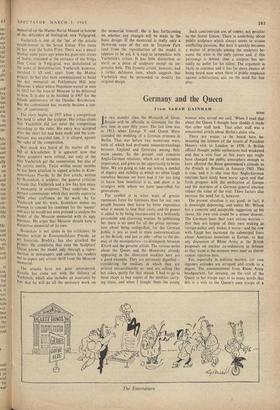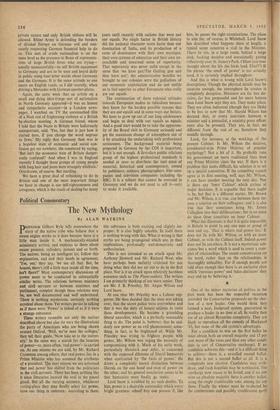Germany and the Queen
From SARAH GAINHAM
BONN
I N two months' time the Monarch of Great 'Britain will be officially in Germany for the first time in over fifty years. The last time was in 1913, when George V and Queen Mary attended the wedding of a German princess in Berlin. That was before two monstrous wars, both of which had profound misunderstandings between England and Germany among their main causes. So the present visit concerns Anglo-German relations, which are of immense importance, and gives us the opportunity to better them. We are going to take our totem, a symbol of dignity and stability at which we often laugh ourselves because we have had it for loo long to know how beneficial it is, and show it to strangers with whom we have quarrelled for generations.
The symbol is in some ways of greater numinous force for Germans than for our own people because they know by bitter experience what it means to lose their roots, and its power is added to by being incorporated in a brilliantly personable and charming woman. In publicising her there is no need for all the prissy nervous- ness about being undignified, for the German public is just as used to mass communications as the British, and just as able—often to the dis- may of the manipulators—to distinguish between Kitsch and the genuine article. The various series about the Queen and the Monarchy already appearing in the illustrated weeklies here are a good example. They are extremely dignified— considering the medium in which they are printed extraordinarily so—and are selling like hot cakes, partly for that reason. I had to go to three shops to buy copies of the weeklies carry- ing them, and when I bought them the young woman who served me said, 'When I read that about the Queen I thought how shoddy it made that other stuff look.' That other stuff was a sensational article about Berlin's dolce vita.
There are voices to be heard here be- moaning the lateness of the return of President Heuss's visit to London in 1958. A British official thought public enthusiasm had weakened and that a visit four or five years ago might have changed the public atmosphere enough to have affected the Bonn government's attitude to the French at Brussels in January 1963. This is true, and it is also true that Anglo-German relations have lately been worse again and that fresh progress with the unification of Europe and the nearness of a German general election reduce the value of the visit. These factors also increase the need for it, however.
The present situation is not good; in fact, it is downright depressing, and unless Mr. Wilson has a concrete and acceptable suggestion up his sleeve, his own visit could be a minor disaster. The Germans have their own serious worries— that they are largely of their own making in foreign policy only makes it worse—and the row with Egypt has increased the submerged fears about American intentions in Europe, so that any discussion of Rhine Army or the British proposals on nuclear co-ordination in defence as they stand at the moment must meet an almost violent rejection here.
For, especially in military matters, our own ingrown attitudes are arrogant and crude- to a degree. The announcement from Rhine Army headquarters, for instance, on the visit of the Queen to her troops says in so many words that this is a visit to the Queen's own troops of a The Entertainers private nature and only British visitors will be allowed. Rhine Army is defending the borders of divided Europe on German soil and con- stantly requesting German financial help to do so. This sort of crude nationalism is on the same level as the presence in Bonn of representa- tives of large British firms who are trying— usually unsuccessfully—to sell British equipment to Germany and are to be seen and heard daily in public using four-letter words about Germany and the Germans. It is the same attitude as one meets on English roads, as I did recently, when driving a Mercedes with German number-plates.
Again, the same week that an article on a small and dying idiot-fringe sect of nationalists in North Germany appeared—it was an honest and sympathetic account—in a London news- paper, I watched on TV the unretouched film of a Nazi riot of frightening violence at a British by-election meeting. A German friend, whom I told that the Nazis in Britain were ludicrously unimportant, said, 'Yes, but that is just how it started here, if you change the word ncgroes to Jews.' My reply that Germany then was in a hopeless state of economic and social con- fusion got me nowhere; she countered by saying, 'But isn't the economic state of Britain danger- ously confused? And when I was in England recently I thought those groups of young people with long hair and jeans were strangely nihilistic.' Overdrawn, of course. But startling.
We have a great deal of rethinking to do in Britain and one of the most important things we have to change is our self-righteousness and arrogance, which is the result of dealing for many years until recently with nations that were not our equals. No single factor in British history did the national character more harm than our domination of India, and its production of a caste of dominators with their own mystique, their own systems of education and their own un- assailable and unearned sense of superiority. That superiority was never valid except in the sense that 'we have got/The Gatling gun and they have not'; the administrative benefits we brought to our colonies were the palliatives of our economic exploitation and do not entitle us to feel superior to other Europeans who really are our equals.
The continuation of these colonial attitudes towards Europeans makes us ridiculous because they know for the hardest possible reasons that they are our equals and in some ways our betters. We have to grow up out of our long adolescence and begin to deal with our equals as equals. And a good start would be to take the opportun- ity of the Royal visit to Germany seriously and get the maximum change of atmosphere out of it by attacking the undertaking with professional seriousness. The background material being prepared in German by the COI is important, but it is not enough. A first-class public relations group of the highest professional standards is needed at once to distribute the vast mass of material, historical and contemporary, owned by publishers, authors, photographers, film com- panies and television companies including the BBC. It is a subject that cannot be oversold in Germany and we do not need to sell it—only to make it available.



































 Previous page
Previous page